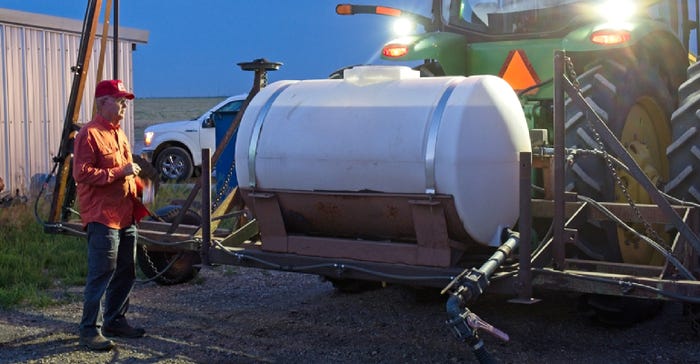January 28, 2021

Cornell University entomologist Elson Shields has written a paper on the true cost of alfalfa snout beetle control to encourage dairy and crop farmers to reduce populations of the pest.
"We estimate that if alfalfa snout beetle becomes fully established on a dairy farm growing its own alfalfa, it can cost the farm $300 to $600 per cow per year,” Shields writes.
His biocontrol nematodes protocol for managing alfalfa snout beetle, highlighted in the paper, also shows great promise for managing corn rootworm.
The research on biocontrol nematodes was started with the support of the Northern New York Agricultural Development Program.
Shields began the quest to find a solution to alfalfa snout beetle in 1989 on the Peck Homestead Farm in Great Bend, N.Y., where damage to alfalfa crops from alfalfa snout beetle was significantly decreasing milk production.

CORN ROOTWORM OPTION: Gary Frost prepares to apply biocontrol nematodes on his Dalhart, Texas, farm. Frost requested a trial of the biocontrol nematodes for management of corn rootworm after reading about the success of the research in northern New York.
Today, the inexpensive biocontrol solution developed by that research benefits dairy farmers and alfalfa, corn, and berry growers in northern New York; organic farmers throughout the Northeast; and corn growers across the U.S. and in Ontario, Canada.
"To date we have applied biocontrol nematodes to nearly 28,000 acres in northern New York on more than 140 farms. In those fields, the alfalfa stand life has increased back to four to six years compared to the previous ASB-ravaged one to two years. Neighboring farms should work together to control ASB on both farms," says Shields, who spoke virtually about the biocontrol nematodes with corn growers in the Southwest in late January and recently shared his research results with the Ontario Ag Conference.
Breaking down costs
Shields breaks the $300- to $600-per-cow cost of ASB into two areas: the cost of forage loss from the field with the cost of replanting, and the cost of purchasing off-farm protein to replace the alfalfa protein lost with the ASB-damaged crop.
Analysts with the W.H. Miner Agricultural Research Institute in Chazy, N.Y., and Oak Point Agronomics in Hammond, N.Y., have estimated the cost of losing and reestablishing an alfalfa stand at $200 to $500 per acre. The cost of additional purchases of soy protein once ASB becomes established and damages a farm's alfalfa crop ranges from $4.70 to $16.80 per cow per month.
How do you know if you have ASB?
Shields says that alfalfa stand loss that is often blamed on winterkill may be the result of ASB.
"Alfalfa snout beetle often kill out the alfalfa on the high spots in the field first, a symptom that should draw attention from the truck as you are driving past,” he says.
The best time to survey a field or farm for ASB is in October when yellowing alfalfa plants can be dug up to examine for ASB larvae.
What can you do if you have ASB?
Alfalfa snout beetle can be controlled for many years with a single application of native New York biocontrol nematodes on each field, using a protocol developed by Shields and Cornell University research support specialist Antonio Testa while working with more than 120 dairy farmers in northern New York. The cost to apply the biocontrol nematodes is a one-time expense in the range of $40 to $60 per acre.
Recent research has shown the biocontrol nematodes can be applied as part of a liquid manure application.
Do biocontrol nematodes control corn rootworm?
"We first began to see indications that the biocontrol nematodes were having an impact on corn rootworm on one of the northern New York farms rotating its alfalfa crop with corn," Shields says. "Recent trials with the biocontrol nematodes in New York and now in other U.S. states are showing their effectiveness at reducing corn rootworm populations, including rootworm populations becoming resistant to Bt-RW-traited corn."
Are biocontrol nematodes effective against other crops?
Shields and Testa have successfully applied the biocontrol nematodes to control pests in berry crops and have trials underway to examine their effectiveness in managing wireworms and Colorado potato beetle.
Who can you call for help?
For more information on the use of biocontrol nematodes, farmers should contact their local Extension office. In northern New York, contacts include Cornell Cooperative Extension field crops specialists Michael Hunter at 315-788-8450 or Kitty O'Neil at 315-379-9192.
You also can contact Cornell Pro-Dairy forage systems specialist Joe Lawrence at 315-788-4815. Also, Mary DeBeer, 518-812-8565, is a northern New York-based provider of the biocontrol nematodes.
More information can be found at nnyagdev.org.
Source: Northern New York Agricultural Development Program, which is solely responsible for the information provided and is wholly owned by the source. Informa Business Media and all its subsidiaries are not responsible for any of the content contained in this information asset.
You May Also Like




